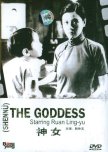
“Are you shoveling to survive, or surviving to shovel?”
This lone stretch of dialogue succinctly sums up the thematic heart of Woman in the Dunes. It is a momentous parable that speaks of the human condition—but which part and to what effect? Is this a story of emancipation despite physical confinement? Perhaps our characters are two Sisyphuses, doomed sinners and prisoners twice over. Or maybe things are more hopeful, despite the bleak atmosphere of the story. What if all of us are digging away at the sands of life, just trying to stay ahead day by day, lest we be crushed? We might be stuck struggling at the bottom forever, but at least there –is- still a bottom. And we may not be alone down there forever, either. What do you think it might be?
Woman in the Dunes speaks to the viewer on a visceral level, using shots so finely detailed as to tickle the senses. There are times the sand moves vibrantly across the screen—one might expect to dip their fingers through the television and feel the grains. Once when the male lead drinks from the limited water, I cringed, almost tasting the salty corruption of the sands.
Our leads engage in an intense sexual relationship, one desperate yet almost like a calculated carnal exchange. The woman acts as a seductress—to bind the man to her?—yet something about the scenes build up and inflame to suggest more as the film rolls along. Please be prepared for sexual elements as they play a large role in Woman in the Dunes. It is not quite a “pink film,” however; we predate those by several years.
Despite the exemplary cinematography, my favorite element of this film must be the score. Without the stylings of Takemitsu Toru, the uncanny atmosphere of Woman in the Dunes would be shattered. He lends scenes an off-kilter feel, sometimes even palpable suspense, though they might seem otherwise quiet. This helps build the overall effect of the film to its crescendo. One effect in particular left an impression on me: a high-pitched sound, as if rocks were scraping across a tin roof.
Was this review helpful to you?

A magnificent piece of filmmaking, the picture uses visual metaphors and allegory as a form of social commentary. What exactly is its message? You decide, but there's absolutely no doubt that every piece of cinematic tool is put to the most effective use in an effort to help you decipher what you will.
The roles are well cast, the performances alternately heartfelt and disturbing, the story layered with symbolism and pregnant with meaning. The cinematography dazzling in its simplicity. Even more, what particularly struck me was how nature and sound became characters in their own right, enriching the film's atmosphere with a foreboding presence.
I loved the movie because it inspires me as someone who wants to make films and it provides me with entertainment that seduces my brain and leaves a catch in my breath.
This is certainly worth your time if you like your films artful and intelligent, but coincidentally it can also be consumed as mindless entertainment. If you so choose. You can choose to not look for its deeper meaning and just be caught up in the urgent passions of the film's protagonists.
Woman in the Dunes is outstanding, and gets an overall 10 from me for a story filled with impeccable nuance, skillful direction of actors, camera, space and time; and last but least how elementary tools of the craft were used to create something visually appealing and all together intellectually compelling.
Where I'm concerned this goes to show that old school filmmakers remain the true masters of cinema.
Was this review helpful to you?

Kind-of boring
Every once in a while I come across a "classic" that I just can't bring myself to like. "In the Realm of the Senses" comes to mind since it's also a classic Japanese film. However, while that one made me very uncomfortable, "Woman in the Dunes" just kinda bored me. I can appreciate the story, the acting, the message, etc. But, at the end of the day, it put me to sleep literally."Woman in the Dunes" follows Niki Junpei (played by Okada Eiji), a substitute teacher and bug enthusiast, who comes to a remote village surrounded by sand. The villagers trap Junpei with a recently widowed woman (Kishida Kyoko). Every night, the woman shovels sand and the villagers take it away. Junpei tries in vain to escape the sand pit throughout the movie. An obvious allegory to Sisyphus.
Like I said, I can appreciate this plot. I felt that it did its job as it made me feel anxious and claustrophobic. But still, I fell asleep and I practically couldn't wait for it to end. To conclude, I didn't like it but I see it's artistic merit.
Was this review helpful to you?

Stockholm syndrome, internalized oppression, capitalist prison, and quarantines. They were constrained to dwell in a constant lockdown wherein their forced labor was their only choice of survival. Yet, as he was about to return to his fat cat city and material job, he was clinging onto the suffocating sands.
In a world where choking is the only relief for drowning, perhaps, freedom is only a spectre, a spirit, a state of mind.
He went up to see the sea. He went down to check the water mysteriously pumped by the damp sand. A child looked down on him. He looked up to the child. She might bear a child. He might bear an invention, a discovery. She was in pain; he was ignited with enthusiasm. The storm frightened her: all its raging winds and waters, killed her husband and child. He held no fear, but hope in the water which might sustain the future of his child.
Only the sands could tell the events of the man for seven years. Though, certainly, the woman in the dunes was there to stay forever.
Was this review helpful to you?







































